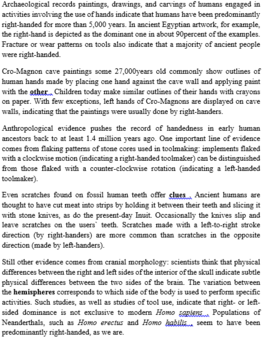Read the following passage and mark the letter A, B, C or D to indicate the correct answer to each of the questions from 36 to 42.
Life expectancy is the period of time that a person can expect to live. Life expectancy varies greatly between genders and cultures. It used to be that women had a lower life expectancy than men (1 in every 4 women died in childbirth), but now they live an average of four to five years longer than men. Life expectancy has been increasing rapidly over the last centuries. With the advent of such modern miracles as sewers, medicine and a greater understanding of how diseases are spread, our life expectancy has increased by 25-30 years.
In developing countries like Swaziland, where there is a high HIV/ AIDS rate, life expectancy is as low as 32.6 years. In developed countries like Australia, life expectancy rates are as high as 81 years. There are an increasing number of factors which can cancel out the disadvantages you have. The one that we are looking at now is how your career can affect your life expectancy. Choosing the wrong career can result in a shorter life!
If you want your career to positively influence your life expectancy, you have to be made of money. That's right. Rich people in wealthy areas of England and France live 10 years longer than the people in poorer areas. Having a successful career has its drawbacks, too if the result of hard work is stress.
Stress can lead to a number of psychological disorders such as depression, anxiety, fatigue, tension and aggression. These conditions may result in a lack of concentration and an increase in serious injuries at work. They can also lead to high blood pressure and heart attacks which seriously affect life expectancy.
If you are worried that your job might decrease your life expectancy, you probably need to avoid careers on "dangerous jobs" list such as timber cutters, pilots, construction workers, roofer, truck drivers.
So if you don't want to kick the bucket at an early age, choose a career in something other than timber cutting, but above all, remember to relax.
From Pre-Essence Reading by Rachel Lee, Longman
According to the passage, all of the following are true EXCEPT
A. our life expectancy has increased by 25-30 years because there are fewer wars nowadays
B. in the past, women's life expectancy was lower than that of men
C. life expectancy varies greatly depending on genders and cultures
D. there has been a dramatic increase in average life expectancy over the last centuries




Đáp án A
Dịch nghĩa: Theo bài, tất cả các thông tin sau đều đúng, trừ ____________.
A. tuổi thọ tăng từ 25-30 năm vì bây giờ có ít chiến tranh hơn.
B. ngày trước tuổi thọ của phụ nữ thấp hơn đàn ông
C. tuổi thọ thay đổi nhiều phụ thuộc vào giới tính và văn hóa
D. có một sự tăng đáng kể tuổi thọ trung bình trong vòng thế kỉ trước.
Giải thích: B đúng vì trong đoạn 1 “It used to be that women had a lower life expectancy than men”
C. đúng vì trong đoạn 1 có nói về khác biệt về tuổi thọ qua giới tính, đoạn 2 nói về văn hóa như Australia và Swaziland.
D. đúng vì trong đoạn 1 “Life expectancy has been increasing rapidly over the last centuries”
Như vậy, chỉ có phương án A không đúng. Thực tế tuổi thọ tăng 25-30 năm, nhưng là do tiến bộ y học, không phải do ít chiến tranh hơn “With the advent of such modern miracles as sewers, medicine and a greater understanding of how diseases are spread, our life expectancy has increased by 25-30 years”